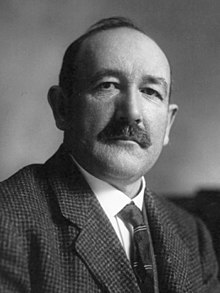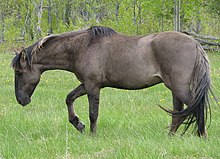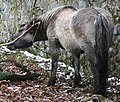Portal:Horses
The Horses PortalThe horse (Equus ferus caballus) is a domesticated, one-toed, hoofed mammal. It belongs to the taxonomic family Equidae and is one of two extant subspecies of Equus ferus. The horse has evolved over the past 45 to 55 million years from a small multi-toed creature, Eohippus, into the large, single-toed animal of today. Humans began domesticating horses around 4000 BCE, and their domestication is believed to have been widespread by 3000 BCE. Horses in the subspecies caballus are domesticated, although some domesticated populations live in the wild as feral horses. These feral populations are not true wild horses, which are horses that never have been domesticated. There is an extensive, specialized vocabulary used to describe equine-related concepts, covering everything from anatomy to life stages, size, colors, markings, breeds, locomotion, and behavior. Horses are adapted to run, allowing them to quickly escape predators, and possess a good sense of balance and a strong fight-or-flight response. Related to this need to flee from predators in the wild is an unusual trait: horses are able to sleep both standing up and lying down, with younger horses tending to sleep significantly more than adults. Female horses, called mares, carry their young for approximately 11 months and a young horse, called a foal, can stand and run shortly following birth. Most domesticated horses begin training under a saddle or in a harness between the ages of two and four. They reach full adult development by age five, and have an average lifespan of between 25 and 30 years. Horse breeds are loosely divided into three categories based on general temperament: spirited "hot bloods" with speed and endurance; "cold bloods", such as draft horses and some ponies, suitable for slow, heavy work; and "warmbloods", developed from crosses between hot bloods and cold bloods, often focusing on creating breeds for specific riding purposes, particularly in Europe. There are more than 300 breeds of horse in the world today, developed for many different uses. (Full article...) Entries here consist of Good and Featured articles, which meet a core set of high editorial standards.
Homer Calvin Davenport (March 8, 1867 – May 2, 1912) was a political cartoonist and writer from the United States. He is known for drawings that satirized figures of the Gilded Age and Progressive Era, most notably Ohio Senator Mark Hanna. Although Davenport had no formal art training, he became one of the highest paid political cartoonists in the world. Davenport also was one of the first major American breeders of Arabian horses and one of the founders of the Arabian Horse Club of America. A native Oregonian, Davenport developed interests in both art and horses as a young boy. He tried a variety of jobs before gaining employment as a cartoonist, initially working at several newspapers on the West Coast, including The San Francisco Examiner, purchased by William Randolph Hearst. His talent for drawing and interest in Arabian horses dovetailed in 1893 at the Chicago Daily Herald when he studied and drew the Arabian horses exhibited at the World's Columbian Exposition. When Hearst acquired the New York Morning Journal in 1895, money was no object in his attempt to establish the Journal as a leading New York newspaper, and Hearst moved Davenport east in 1885 to be part of what is regarded as one of the greatest newspaper staffs ever assembled. Working with columnist Alfred Henry Lewis, Davenport created many cartoons in opposition to the 1896 Republican presidential candidate, former Ohio governor William McKinley, and Hanna, his campaign manager. McKinley was elected and Hanna elevated to the Senate; Davenport continued to draw his sharp cartoons during the 1900 presidential race, though McKinley was again victorious. (Full article...) Selected image Burchell's Zebra (Equus quagga burchellii) is a southern subspecies of the Plains Zebra. Latest updates
More did you know?
Related portalsEntries here consist of Good and Featured articles, which meet a core set of high editorial standards.
The Sorraia is a rare breed of horse indigenous to the portion of the Iberian Peninsula, in the Sorraia River basin, in Portugal. The Sorraia is known for its primitive features, including a convex profile and dun coloring with primitive markings. Concerning its origins, a theory has been advanced by some authors that the Sorraia is a descendant of primitive horses belonging to the naturally occurring wild fauna of Southern Iberia. Studies are currently ongoing to discover the relationship between the Sorraia and various wild horse types, as well as its relationship with other breeds from the Iberian Peninsula and Northern Africa. Members of the breed are small, but hardy and well-adapted to harsh conditions. They were occasionally captured and used by native farmers for centuries, and a remnant population of these nearly extinct horses was discovered by a Portuguese zoologist in the early 20th century. Today, the Sorraia has become the focus of preservation efforts, with European scientists leading the way and enthusiasts from several countries forming projects and establishing herds to assist in the re-establishment of this breed from its current endangered status. (Full article...) Did you know (auto-generated)
General imagesThe following are images from various horse-related articles on Wikipedia.
TopicsHorse • Pony • Asinus • Equus (genus) • Equidae • Zebra • Glossary of equestrian terms • List of horse breeds • Evolution of the horse • Domestication of the horse • Horse care • Stable • Horse training • Equestrianism • Horse tack • Saddle • Equine nutrition • Equine anatomy • Equine conformation • Equine coat color • Equine coat color genetics • Horse markings • Equine vision • Horse hoof • Horseshoe • Horse gait • Horse behavior • Horse breeding • Breed registry • Equine infectious anemia • Horse colic • Lameness • Laminitis • Horse slaughter • Horses in warfare • Arabian horse • Thoroughbred SubcategoriesNew articlesThis list was generated from these rules. Questions and feedback are always welcome! The search is being run daily with the most recent ~14 days of results. Note: Some articles may not be relevant to this project.
Rules | Match log | Results page (for watching) | Last updated: 2024-12-24 20:19 (UTC) Note: The list display can now be customized by each user. See List display personalization for details.
WikiProjectsAssociated WikimediaThe following Wikimedia Foundation sister projects provide more on this subject:
Discover Wikipedia using portals |




























































